The Complete Guide to Disposable Salad Bowls
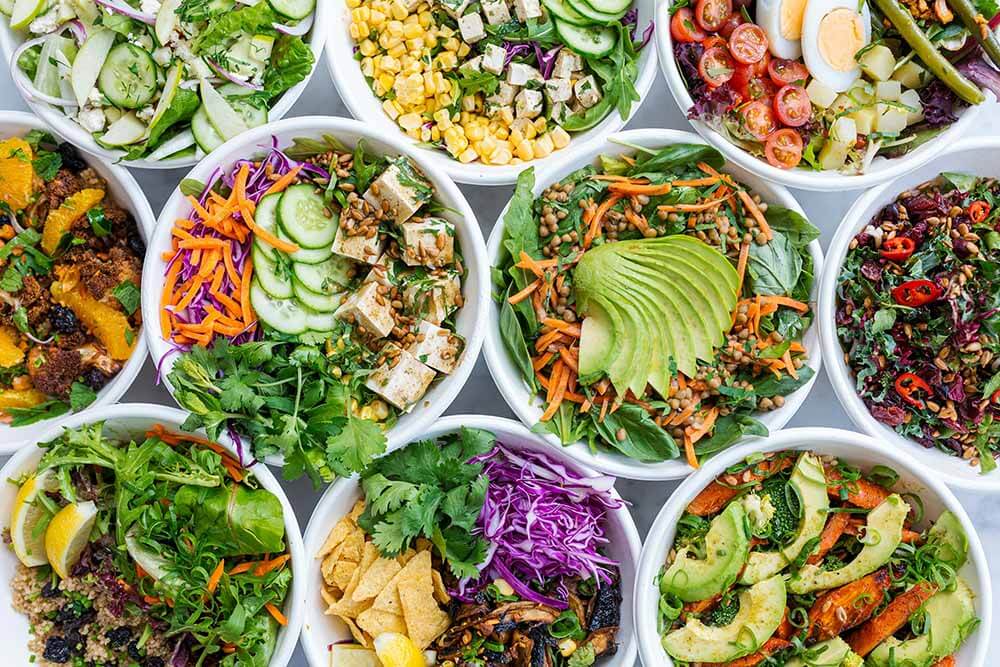
Disposable salad bowls are ubiquitous tableware in our daily lives. They are widely used in homes or any commercial places that need to provide food. There are many types of salad bowls on the market. When you need to buy them, do you know how to make the right choice? Today, let’s take a look at the complete guide to disposable salad bowls.
What are Disposable Salad Bowls?
Disposable salad bowls are a type of specifically designed single use food container for serving salads. They are normally round and made from various materials, each material has its own pros and cons.
Common Types of Disposable Salad Bowls
Paper Salad Bowls: Made from paper, typically lined with a wax or plastic coating to prevent leaks. Not suitable for serving food with too much sauce or liquid or soup.
Plastic Salad Containers: Made from PET, PP, or PLA, their outer appearance is almost the same, look transparent. They are suitable for various foods, including dry food, semi-dry food, and moist food.
Compostable Bowls: Made from sugarcane or cornstarch, well known for its biodegradable and compostable features. Reduces the burden of contamination from disposable tableware, a wise eco-friendly choice.
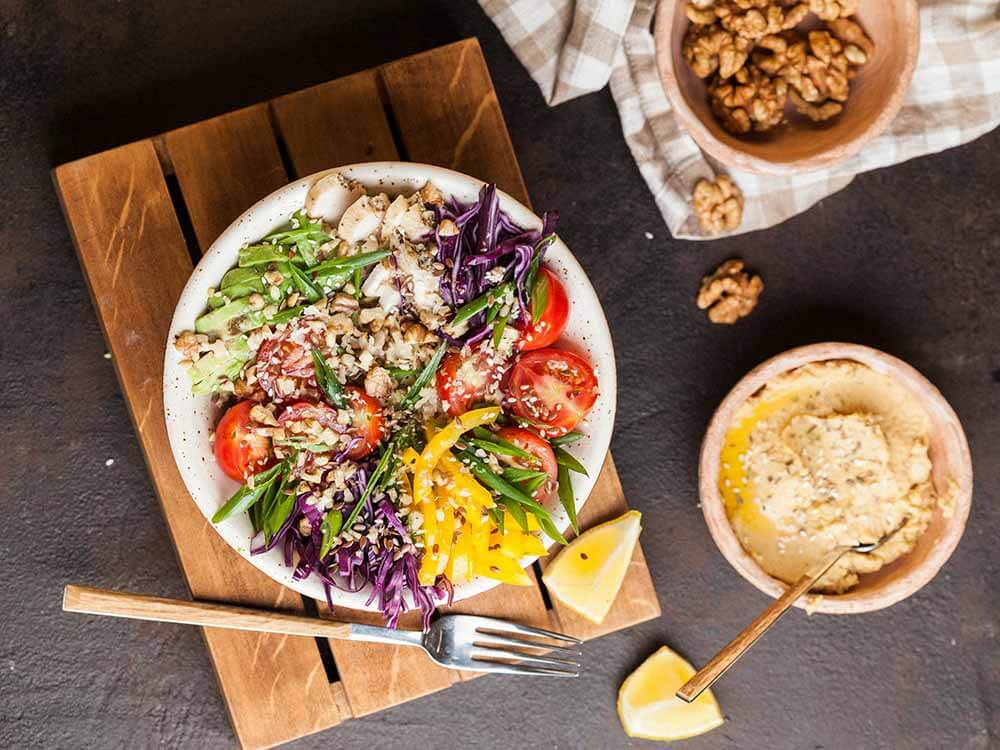
Compostable Bowls
Compostable packaging is a new environmentally friendly packaging solution that has been developed in recent years to reduce or even replace the use of plastic packaging. These packaging usually come from renewable resources, generally some plant-based materials, such as corn starch, sugarcane bagasse, etc. The cultivation and production of these materials do not require harsh conditions, so the supply of these packaging materials is very stable. Use compostable packaging materials to make compostable bowls or other food containers, decompose them in composting facilities, and the nutrient-rich compost left can be used again.
Disposable salad bows are always the convenient choice for use in the home or as salad bowls to go . While it is convenient, the problem of environmental pollution cannot be ignored. The emergence of compostable salad bowls will not end up in landfills like plastic bowls and pollute the environment.
Benefits of Compostable Bowls
- Reduced Environmental Impact: Using plant-based materials as raw materials, such as cornstarch, sugarcane fiber, or bamboo, reduces the use of petroleum-based materials. This will reduce the carbon footprint and greenhouse gas emissions.
- Biodegradability: Compostable bowls can break down into organic matter when disposed of in composting facilities. But the plastic bowls will stay in the landfills and oceans for a long time.
- Contributing to the Circular Economy: Composting waste, including compostable bowls and foods, will produce nutrient-rich compost, which could support agricultural activities. This closes the loop in the production cycle and promotes a circular economy.
- Durable: High-quality compostable bowls are durable, no matter in terms of load-bearing or waterproofing, it is not inferior to plastic bowls.
- Comply with Local Regulations: Many countries and locations have banned using plastic or foam food packaging material. Using compostable bowls can help your business comply with these regulations.
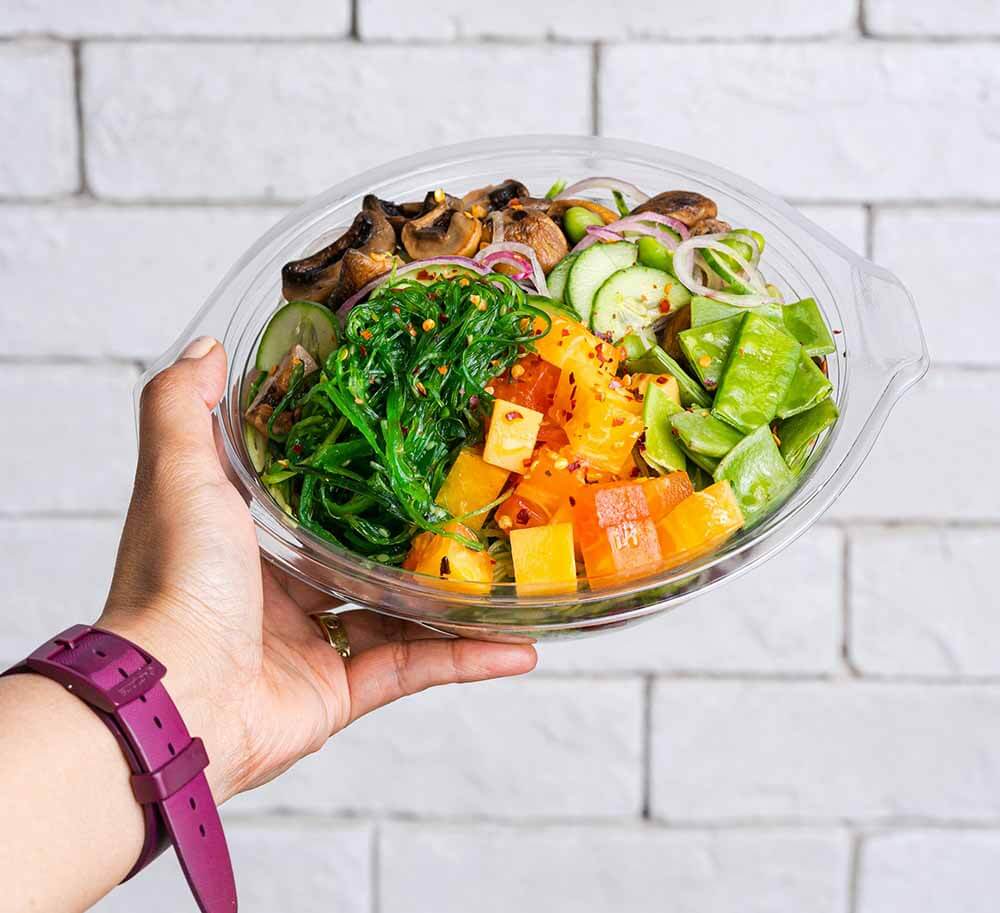
Plastic Salad Containers
Regarding plastic salad containers, there are mainly 3 materials on the market, they are PET, PP, and PLA.
PET Salad Bowls
The throw away salad containers made from PET (Polyethylene Terephthalate) have high strength, high transparency, and recyclability. Recyclability is an important advantage of PET, and proper disposal of these disposable salad bowls after use can greatly reduce the impact of plastic on the environment.
Benefits of PET Salad Bowls
- Clearly Display Ingredients: The PET salad bowls have high transparency, and clearly show your salads to consumers.
- High Strength and Durability: Disposable salad containers made by PET have very high strength and durability, it can withstand violent handling during transportation and storage without breaking, ensuring the quality of the salad remains intact to the greatest extent.
- Great Barrier Properties: PET has excellent gas and moisture barrier properties, which can maintain the crispness of vegetables to the greatest extent and prolong the freshness of salads.
- High Recyclability: Compared to other types of plastics, PET has a very high recycling rate. PET salad bowls can be recycled into new products, saving resources and reducing the impact on the environment.
- Cost-Effectiveness: PET salad bowls are cost-effective, offering a balance between performance and price. They provide excellent durability and aesthetic appeal at a relatively low cost, making them an economical choice for businesses.
PP Salad Bowls
PP (Polypropylene) salad containers are known for their durability and resistance to heat, making them suitable for a variety of food storage applications. PP containers are not as transparent as PET, but they have excellent heat and chemical resistance, which means that PP salad bowls can be used in microwaves if they need to be heated. PP is also a recyclable material, but the recycling rate is lower than PET.
Benefits of PP Salad Bowls
- Durability and Strength: PP (Polypropylene) salad bowls are highly durable and resistant to impacts. In daily use, there is no risk of breakage even if it is dropped or treated roughly, making it a reliable choice.
- Heat Resistance: One of the key advantages of PP salad bowls is their high resistance to heat. This feature makes the PP bowl very versatile, including serving hot food or heating up leftovers, which is especially beneficial for busy households and food service providers.
- Chemical Resistance: PP salad bowls offer excellent resistance to chemicals, including acids, bases, and organic solvents. This makes them suitable for holding various types of salads with acidic dressings or ingredients. The chemical resistance of PP ensures that the material does not degrade or leach harmful substances into the food, maintaining both safety and integrity.
- Cost-Effectiveness: PP is generally more affordable than some other plastics, making PP salad bowls a cost-effective choice for both manufacturers and consumers.
- Recyclability: Although the recycling rate for PP is lower than that for PET, PP is still recyclable. Try to recycle used PP salad bowls to reduce the impact of plastic on the environment.
PLA Salad Bowls
PLA (Polylactic Acid) salad containers are made from renewable resources such as cornstarch or sugarcane, they are compostable in industrial composting facilities, and then break down into non-toxic components that can enrich the soil. However, the effectiveness of PLA composting relies on access to appropriate composting facilities, which are not yet universally available. PLA salad bowls look very similar to other plastic bowls, but their melting point is low, so are not widely used with hot foods.
Benefits of PLA Salad Bowls
- Eco-Friendly and Renewable: PLA (Polylactic Acid) salad bowls are made from renewable resources such as cornstarch, sugarcane, or cassava roots. This makes them a sustainable alternative to traditional petroleum-based plastics.
- Biodegradability and Compostability: Under industrial composting conditions, PLA salad bowls can break down into water, carbon dioxide, and organic matter within a few months.
- Safety and Non-Toxicity: PLA is made from natural, plant-based materials and is free from harmful chemicals such as BPA (Bisphenol A). This makes PLA salad bowls a safer option for food packaging, ensuring that no toxic substances leach into the food.
- Good Visual Experience: The PLA salad bowl is transparent and smooth. When you put your exquisite salad in it, it can bring a very good visual experience to consumers.
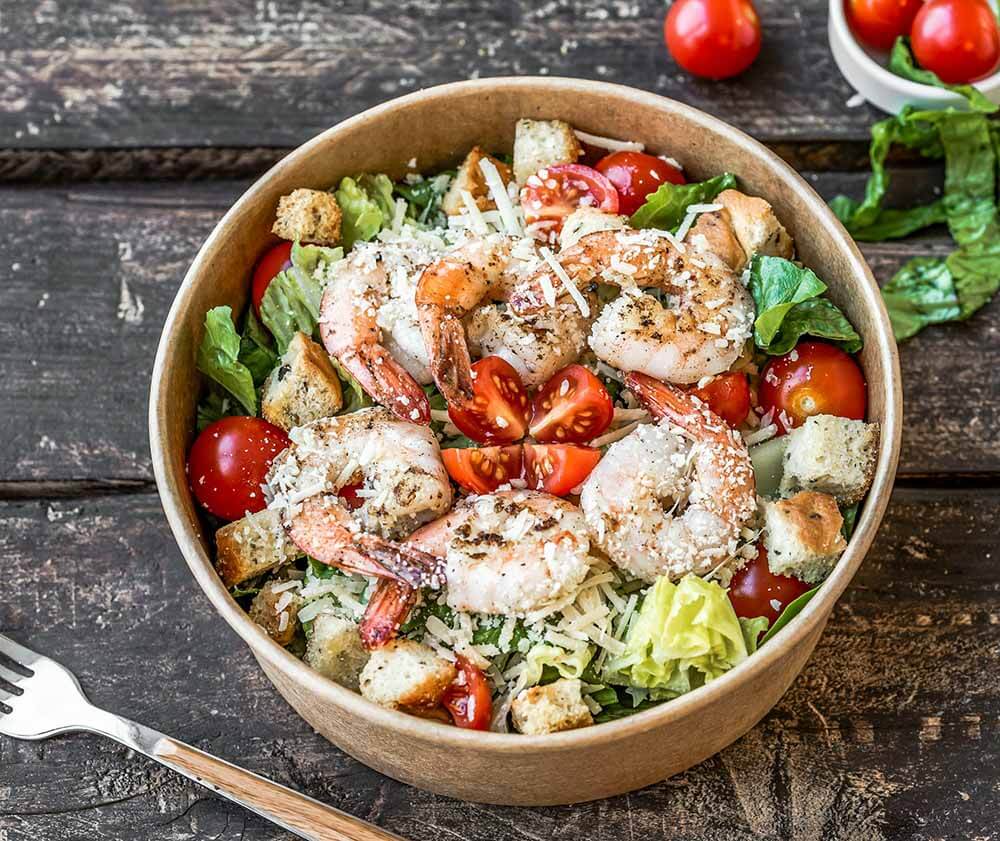
Paper Salad Bowls
Paper salad bowls are also another alternative to plastic salad bowls. These bowls are mainly made from wood pulp, they are biodegradable with eco-friendly coating to prevent leaks and maintain their integrity.
Benefits of Paper Salad Bowls
- Eco-Friendly and Sustainable: Paper salad bowls are made from renewable resources like wood pulp, making them a sustainable choice.
- Leak-Resistant Coating: Many paper salad bowls come with an eco-friendly coating that prevents leaks and maintains the integrity of the bowl. They can ensure the bowls serving salad with sauces or dressings won’t become soggy.
- Microwave Safe: Paper salad bowls can not only for salad but also for other foods that need to be reheated. The paper serving bowls are safe to reheat the food in the microwave.
How to Choose the Right Disposable Salad Bowls?
Disposable salad bowls can be used at home, in restaurants, or at large banquets. So, they must need different throw away salad containers for different occasions. Here are the factors you need to consider:
Disposable Salad Bowl Material
Plastic: Consumers who want sturdy disposable serving bowls to keep the salad and food fresh, need to choose plastic material.
Compostable: For those consumers who are very environmentally conscious, using compostable bowls is a great choice.
Paper: For consumers, who only take dry foods, the paper salad bows are the cost-effective choice.
Disposable Salad Bowl Size
Disposable salad bowls can be customized into various sizes, from small portions for one person to large portions for a banquet. Want to wholesale disposable salad bowls with lids, contact Eco March to get all you want!
Disposable Salad Bowl Design
Before purchasing, you also need to make sure the design of the disposable serving bowls you want. Whether it is a plastic one, or paper one, or a pulp molding one, they can have different designs and different configurations.
Application Occasions of Disposable Salad Bowls
Disposable salad bowls not only serve for salads but also serving for many other products. Therefore, they appear on a variety of different occasions. Let’s take a look at where disposable serving bowls are used!
Takeout and Delivery Services
Disposable salad bowls can be used as the to go salad bowls. Restaurants, cafes, or any other food service apps can pack the salads or foods into disposable leak-proof bowls and deliver them to their consumers.
Office and School Lunches
You can cook or make the dishes at home and pack these foods into disposable salad containers and take them to your office or school. You can enjoy a healthy meal and don’t need to wash the containers.
Picnics and Outdoor Events
During the holidays, you can go out for a picnic with your friends, you must take many foods and fruits. Now, disposable serving bowls are your practical choice, you will need them to serve your food and you don’t have to carry these dirty dishes back home.
Catering Services
Catering companies, often use throw away salad containers in weddings, corporate gatherings, and parties. These disposable serving bowls are available in various sizes and shapes.
Airlines and Travel
Not just airlines, train travel also prefers using disposable bowls to serve meals to customers. They are lightweight, hygienic, and easy to handle.
Festivals and Food Fairs
At festivals, food fairs, and street markets, vendors use disposable salad bowls to serve salads quickly and efficiently. The bowls’ convenience and ease of disposal make them ideal for high-traffic events where large volumes of food are sold and consumed on-site.
Healthcare and Institutional Settings
Hospitals, nursing homes, and other institutional settings use disposable salad bowls to serve meals to patients and residents. These bowls help maintain hygiene standards by reducing the risk of cross-contamination and simplifying the meal delivery process.
Home Use for Parties and Gatherings
If you are planning to host a party at home, using disposable salad containers is a very good choice. They are both hygienic and convenient. The host and guests can also enjoy together without having to deal with heavy cleaning.
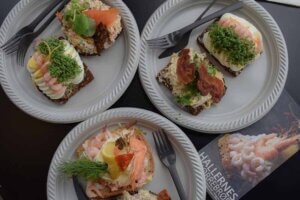
John Q
John Q is Eco March’s Product Manager. With 5 years of prior experience in the food industry after graduating from university, he has been an integral part of Eco March. He excels in creating and developing eco-friendly food packaging products with a keen focus on enhancing the consumer experience.


